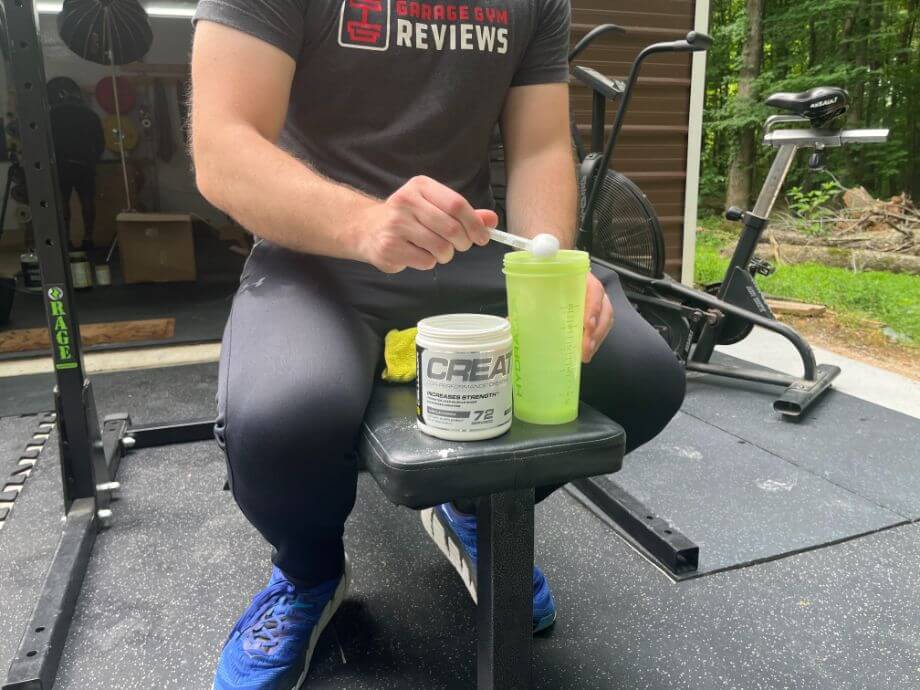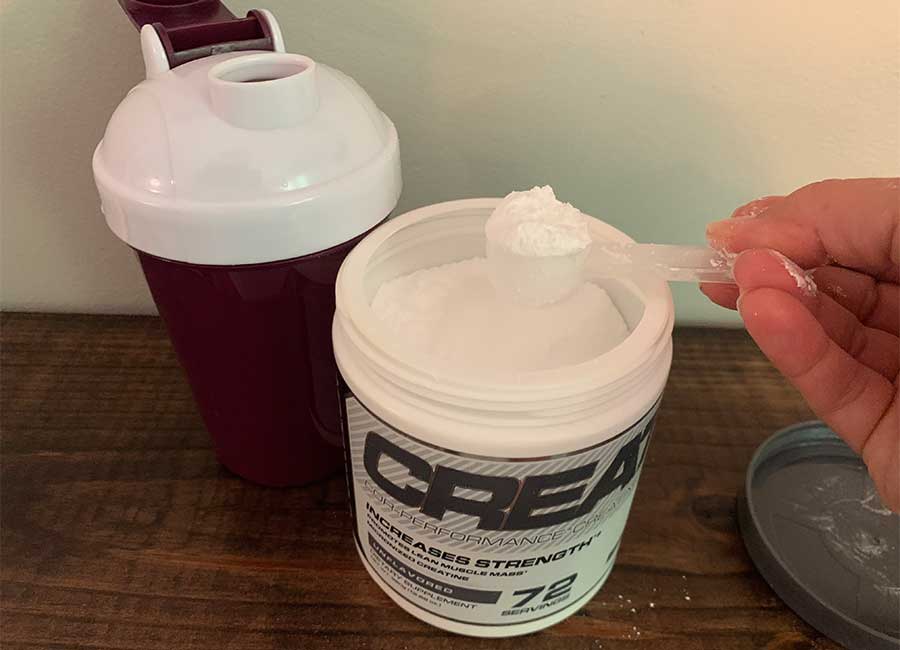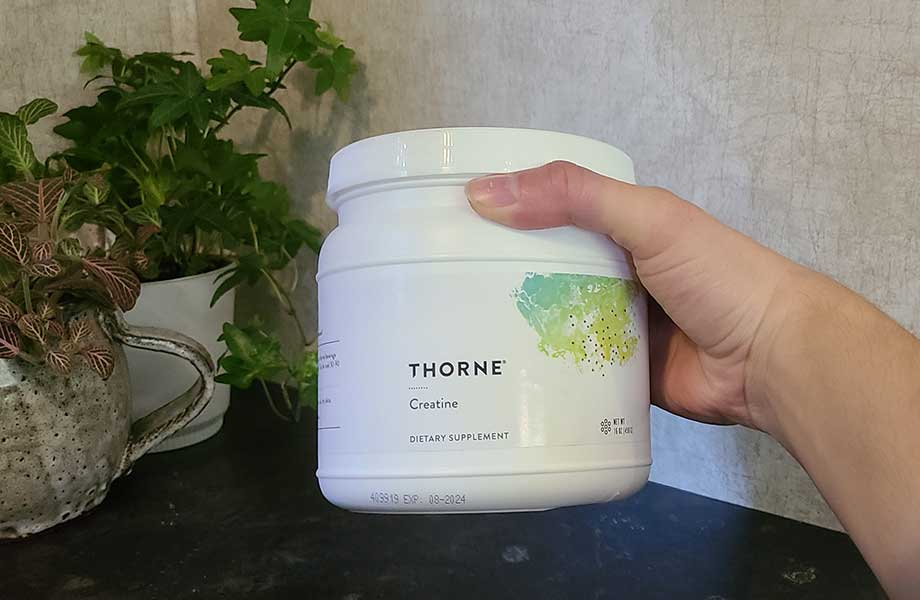We test and review fitness products based on an independent, multi-point methodology. If you use our links to purchase something, we may earn a commission. Read our disclosures.
Creatine is a workout supplement well-known for its positive effects on athletic performance, including increased muscle mass, strength, muscular endurance, and more. If you already use creatine supplements, you’re likely acquainted with such benefits.
But do you take creatine every day or only on training days? If the latter, you may be wondering, “Should I take creatine on rest days?” The short answer to this common question is yes, it’s beneficial to take this dietary supplement even on rest days.
We—with an assist from sports dietitian Destini Moody, RD, CSSD, LD—are here to take a closer look.
RELATED: Best Creatine Supplements
Medical disclaimer: This article is intended for educational and informational purposes only. It is not intended as a substitute for medical advice. For health advice, contact a licensed healthcare provider.
Understanding Creatine’s Role in Muscle Recovery
Muscle cells convert ATP, or adenosine triphosphate, into energy by using creatine, which helps muscles recover from exercise quicker and feel less sore during the recovery period. As a result, you will be able to continue exercising even if your muscles are sore, thereby maintaining your muscle strength and improving your athletic performance1.
How Creatine Works
Creatine2 is a compound synthesized in your body by the amino acids glycine, methionine, and arginine. It has a critical role in one of your body’s major energy systems, the phosphocreatine system. This system drives intense workouts and max-effort attempts such as a one-rep max barbell squat.
To power this system, the body needs ample adenosine triphosphate (ATP)3, which is the main source of energy for muscle contraction. So what do creatine levels have to do with this?

Registered dietitian nutritionist and GGR writer Destini Moody explained it best in our guide to the benefits of creatine for women:
“When there is enough creatine in the muscles, it can be converted to phosphocreatine, which is essentially creatine with a phosphate molecule attached. If there is enough phosphocreatine in the muscles, it can ‘donate’ its phosphate molecule to ADP to make it ATP again. This is how creatine supplementation can provide enough energy needed for the muscle cells to delay fatigue and sustain energy levels during exercise.”
More creatine equals more ATP equals more energy and better performance in the gym—which equals muscle growth. Now it’s not so hard to see why creatine is a holy grail among bodybuilders and athletes, right?
RELATED: How Much Water Should You Drink With Creatine?
Should You Take Creatine on Rest Days?
Based on decades of research3 amounting to thousands of studies on creatine monohydrate, the maintenance dose of creatine is 3 to 5 grams per day—not just on workout days. That information alone tells us that, yes, we should be taking creatine on rest days to maintain creatine stores in the muscle in order to promote optimal performance during resistance training.
Said differently, to see the best possible results from creatine supplementation, taking it consistently every day is key.

Keeping your muscle stores of creatine full even on rest days may enhance muscle recovery in the time periods between your workouts, making the benefits twofold.
If you miss a day here and there, don’t stress it. Creatine builds up in muscle tissue over time, so a few missed days over time won’t make that drastic of a difference. But, if you’re consistently skipping, you definitely won’t reap all of the benefits.
RELATED: Types of Creatine: Which One Should You Choose?
Benefits of Taking Creatine on Rest Days
If you want to get the most out of your training, it’s a good idea not to skip doses of creatine, even on rest days.
Nutritionists or other fitness professionals may refer to creatine taken on rest days as a “maintenance dose” since it helps the muscles maintain their creatine levels even when you aren’t using it for performance or strength.
For consistency, many of the studies showing creatine’s benefits had the subjects supplement with the compound even on their rest days.
However, this doesn’t mean you have to supplement on rest days. Though, it likely gives you the best results if you do, and at the very least, it can help you recover better when you do get back in the gym.
Timing and Dosage Recommendations
Wondering, “When is the best time to take creatine?” The answer is—there is no best time. Creatine’s effectiveness isn’t determined by the time of day you take it, though some gym-goers swear by taking it pre-workout. One element that may help with creatine is how you take it, meaning you may be able to elevate your creatine levels better when combined with a meal or shake.

As for the dosage, 3 to 5 grams of creatine is considered the optimal daily dose—training or rest day—or if you’re in a creatine loading phase, 20 grams spread out in 5-gram increments throughout the day3.
“The dosage of creatine used in clinical trials on rest days is typically 5 grams, the maximum efficacious dose. It does not matter the time of day you take it, so take it at whatever time is best for you!” adds Destini Moody, RD, CSSD, LD.
Final Thoughts: Should I Take Creatine on Rest Days?
Creatine is a heavily studied sports nutrition supplement with well-documented benefits including increases in lean muscle mass, strength, power, and more. Taking a creatine powder every day in the clinically recommended dose of 3 to 5 grams will maximize creatine stores in the muscle tissue and optimize performance and outcomes.
Should I Take Creatine on Rest Days? FAQs
Does whey protein powder have creatine in it?
No, protein powder does not contain creatine unless it’s added to make the product some sort of blend to build muscle. That type of blended supplement may also contain added branched-chain amino acids (BCAAs) for recovery. In general, people take their protein and creatine separately, although you could add creatine to your protein shake post-workout if you want. (See our picks for the best protein powders.)
When should I take creatine?
According to most research5, the time of the day that you take creatine doesn’t matter as much as the amount of creatine you take daily. There may be some added benefit to taking it after a workout6 as opposed to pre-workout, but more research is needed on that front. The important thing is ensuring you get 3 to 5 grams of creatine per day to see improvements in exercise performance. See our guide to how and when to take creatine for more information.
What are the side effects of creatine?
Creatine causes water retention, specifically in muscle cells, and many people experience bloating in the first few days or weeks of upping their creatine intake.
For those who plan on loading creatine (a creatine loading phase is when you consume a high dose of 20 to 25 grams per day for five to seven days), such side effects might be more intense. Most people find that these side effects subside after a couple of weeks in the maintenance phase.
Some people also experience weight gain, but that increase in body weight is in the form of muscle tissue or water weight—creatine does not have calories so it cannot cause fat gain.
Is it OK to take creatine on rest days?
Yes, in fact it’s recommended that you do so for maintenance.
Can you take creatine if you don’t work out?
You can, but the only time it would provide much benefit is if one is injured or otherwise immobile and wishes to use creatine to mitigate muscle losses as there has been evidence that creatine supplementation can lower the rate of atrophy.
Similarly, some studies7 also show that creatine can help treat age-related sarcopenia.
Can you skip creatine for a day?
Yes, your creatine stores shouldn’t be affected if you miss a dose or choose not to take creatine that day.
When should I take creatine on rest days?
Because there is no ideal time to take creatine, you can have it whenever you want on your rest day. That said, taking your creatine around the same time you would on a training day may be a good call, as it can help you establish a routine.
These statements have not been evaluated by the Food and Drug Administration. This product is not intended to diagnose, treat, cure, or prevent any diseases.
References
- Volek JS, Ratamess NA, Rubin MR, Gómez AL, French DN, McGuigan MM, Scheett TP, Sharman MJ, Häkkinen K, Kraemer WJ. The effects of creatine supplementation on muscular performance and body composition responses to short-term resistance training overreaching. Eur J Appl Physiol. 2004 May;91(5-6):628-37. doi: 10.1007/s00421-003-1031-z. Epub 2003 Dec 18. PMID: 14685870.
- National Center for Biotechnology Information. PubChem Compound Summary for CID 586, Creatine. https://pubchem.ncbi.nlm.nih.gov/compound/Creatine.
- Dunn J, Grider MH. Physiology, Adenosine Triphosphate. [Updated 2023 Feb 13]. In: StatPearls [Internet]. Treasure Island (FL): StatPearls Publishing; 2023 Jan-. Available from: https://www.ncbi.nlm.nih.gov/books/NBK553175/
- Naderi A, de Oliveira EP, Ziegenfuss TN, Willems MT. Timing, Optimal Dose and Intake Duration of Dietary Supplements with Evidence-Based Use in Sports Nutrition. J Exerc Nutrition Biochem. 2016;20(4):1-12. doi:10.20463/jenb.2016.0031
- Ribeiro F, Longobardi I, Perim P, et al. Timing of Creatine Supplementation around Exercise: A Real Concern?. Nutrients. 2021;13(8):2844. Published 2021 Aug 19. doi:10.3390/nu13082844
- Antonio J, Ciccone V. The effects of pre versus post workout supplementation of creatine monohydrate on body composition and strength. J Int Soc Sports Nutr. 2013;10:36. Published 2013 Aug 6. doi:10.1186/1550-2783-10-36
- Candow DG, Forbes SC, Chilibeck PD, Cornish SM, Antonio J, Kreider RB. Effectiveness of Creatine Supplementation on Aging Muscle and Bone: Focus on Falls Prevention and Inflammation. J Clin Med. 2019 Apr 11;8(4):488. doi: 10.3390/jcm8040488. PMID: 30978926; PMCID: PMC6518405.
Further reading

Looking to save money on one of the best fitness trackers on the market? We’ve found the best FitBit promo code to help you save money. Read more

TYR footwear is the new kid in the CrossFit arena. In our TYR L-1 Lifters review, learn how these new kicks stand up to classics like Romaleos and Adipowers. Read more

Our experts help you find the best water rowing machine for home gyms based on budget, programming, durability, and more. Read more

It’s not often that Eleiko releases an all-new bar. So when they sent me the Hybrid Bar to test, I was ready to give it the respect and attention a brand like Eleiko commands. To add to the excitement, this bar was made with a never-before-seen coating that immediately sets it apart from so many otherOlympic barbell competitors.After using it, I can confidently say the Eleiko Hybrid bar has:An excellent knurl for multi-purpose useA fine balance between spin and sleeve stabilityA sturdy construction that lives up to Eleiko’s name.Along with all of the positives, there are a few things I’m not too keen on with this bar. Eleiko bars are among the most expensive in the world and to me, some features on the Hybrid don't align with that.Why You Should Trust UsBarbells are my thing. I’ve spent years researching more than 100 barbells and have personally used more than 80 different bars of all kinds including deadlift bars,trap bars and specialty bars.On top of that, we have a diverse team at Garage Gym Reviews responsible for testing and evaluating bars using our multi-step protocol. We make it a point to consider the bars’ intended use and how the perspective on that changes from person to person.It’s pretty safe to say we know our barbells. Read more

